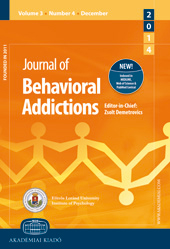Harmonizing Screening for Gambling Problems in Epidemiological Surveys – Development of the Rapid Screener for Problem Gambling (RSPG)
Harmonizing Screening for Gambling Problems in Epidemiological Surveys – Development of the Rapid Screener for Problem Gambling (RSPG)
Author(s): Gaélle Challet-Bouju, Bastien Perrot, Lucia Romo, Marc Valleur, David Magalon, Mélina Fatséas, Isabelle Chéreau-Boudet, Amandine Luquiens, Jeu Group, Marie Grall-Bronnec, Hardouin Jean-BenoitSubject(s): Experimental Pschology, Psychoanalysis, Methodology and research technology, Crowd Psychology: Mass phenomena and political interactions, Substance abuse and addiction
Published by: Akadémiai Kiadó
Keywords: screening; problem gambling; epidemiological surveys; general population; RSPG;
Summary/Abstract: The aim of this study was to test the screening properties of several combinations of items from gambling scales, in order to harmonize screening of gambling problems in epidemiological surveys. The objective was to propose two brief screening tools (three items or less) for a use in interviews and self-administered questionnaires. Methods: We tested the screening properties of combinations of items from several gambling scales, in a sample of 425 gamblers (301 non-problem gamblers and 124 disordered gamblers). Items tested included interview-based items (Pathological Gambling section of the DSM-IV, lifetime history of problem gambling, monthly expenses in gambling, and abstinence of 1 month or more) and self-report items (South Oaks Gambling Screen, Gambling Attitudes, and Beliefs Survey). The gold standard used was the diagnosis of a gambling disorder according to the DSM-5. Results: Two versions of the Rapid Screener for Problem Gambling (RSPG) were developed: the RSPG-Interview (RSPG-I), being composed of two interview items (increasing bets and loss of control), and the RSPG-Self-Assessment (RSPG-SA), being composed of three self-report items (chasing, guiltiness, and perceived inability to stop). Discussion and conclusions: We recommend using the RSPG-SA/I for screening problem gambling in epidemiological surveys, with the version adapted for each purpose (RSPG-I for interview-based surveys and RSPG-SA for self-administered surveys). This first triage of potential problem gamblers must be supplemented by further assessment, as it may overestimate the proportion of problem gamblers. However, a first triage has the great advantage of saving time and energy in large-scale screening for problem gambling.
Journal: Journal of Behavioral Addictions
- Issue Year: 5/2016
- Issue No: 2
- Page Range: 239-250
- Page Count: 12
- Language: English

